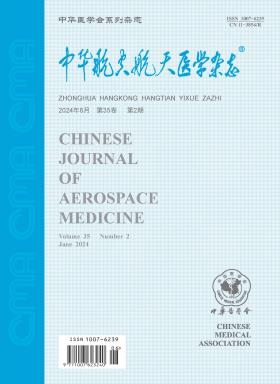飞行员胺碘酮致甲状腺功能障碍2例并文献复习
引用次数: 0
摘要
目的总结胺碘酮致心律失常飞行员甲状腺功能障碍的临床特点、诊断、治疗及预后,总结治疗及航空医学评估经验。方法回顾性分析2例胺碘酮致飞行员心房颤动甲状腺功能异常的治疗过程及文献资料,总结其临床特点、诊断、治疗及预后。结果病例1服用胺碘酮7个月,1个月后诊断为低T3综合征。2年后再次服用胺碘酮1个月,并发2型甲状腺毒碘。停服胺碘酮3个月后,甲状腺功能恢复正常。病例2在间歇性服用胺碘酮9年后诊断为碘性甲状腺功能减退。患者改为每日75 μg左甲状腺素治疗5个月,甲状腺功能正常。经2年左旋甲状腺素治疗,甲状腺功能完全恢复。对两名飞行员的航空医疗评估是暂时不合格的心律失常。结论服用胺碘酮前应进行甲状腺相关检查。在胺碘酮治疗中,或停药6-9个月甚至更长时间后,建议定期随访,特别是有甲状腺疾病史和有危险因素的患者。胺碘酮引起的甲状腺功能异常是可以治疗的。航空医学评估应关注心律失常和甲状腺功能。关键词:胺碘酮;甲状腺功能亢进;甲状腺功能减退;诊断;治疗效果;飞行员本文章由计算机程序翻译,如有差异,请以英文原文为准。
Two cases of pilots with amiodarone-induced thyroid dysfunction and literature review
Objective
To summarize the clinic feature, diagnosis, treatment, and prognosis of amiodarone-induced thyroid dysfunction in the pilots with arrhythmia and gather the experiences on treatment and aviation medical assessment.
Methods
Retrospective analysis was done on the process of 2 cases with amiodarone induced abnormal thyroid function in pilots with atrial fibrillation and on the literatures to summary the clinic feature, diagnosis, treatment, and prognosis were reviewed.
Results
Case 1 had taken amiodarone for 7 months and low T3 syndrome was diagnosed 1 month later. Two years later, he took amiodarone again for 1 month and was induced type 2 thyrotoxicosis iodine. After he stopped taking amiodarone for 3 months his thyroid function returned to normal. Case 2 was diagnosed iodine induced hypothyroidism after intermittent taking amiodarone for 9 years. The patient changed to the treatment with 75 μg levothyroxine daily for 5 months and his thyroid function was in normal. By 2-year levothyroxine treatment his thyroid function completely recovered. Aviation medical assessment of two pilots is temporary dlisqualified as arrhythmias.
Conclusions
The thyroid related examination is necessary before taking amiodarone. In the treatment of amiodarone, or after withdrawal for 6-9 months or even longer, the regular follow-up is suggested, especially for the patients with thyroid diseases history and with risk factors. Amiodarone-induced abnormal thyroid function could be treated. The aviation medical assessment should be concerned arrhythmias and thyroid function.
Key words:
Amiodarone; Thyrotoxicosis; Hypothyroidism; Diagnosis; Treatment outcome; Pilots
求助全文
通过发布文献求助,成功后即可免费获取论文全文。
去求助
来源期刊

中华航空航天医学杂志
航空航天医学
自引率
0.00%
发文量
2962
期刊介绍:
The aim of Chinese Journal of Aerospace Medicine is to combine theory and practice, improve and popularize, actively advocate a hundred flowers bloom and a hundred schools of thought contend, advocate seeking truth from facts, promote the development of the related disciplines of aerospace medicine and human efficiency, and promote the exchange and penetration of aerospace medicine and human efficiency with other biomedical and engineering specialties.
Topics of interest for Chinese Journal of Aerospace Medicine include:
-The content of the journal belongs to the discipline of special medicine and military medicine, with the characteristics of multidisciplinary synthesis and cross-penetration, and mainly reflected in the aerospace industry, aerospace flight safety and efficiency, as well as the synthesis of special medicine, preventive medicine, environmental medicine, psychology, etc.
-Military aeromedicine (Air Force, Navy and Army aeromedicine) and civil aeromedicine, with a balance of aerospace medicine are the strengths of the journal.
-The change in aerospace medicine from a focus on promoting physiological compensatory adaptations to enhancing human performance under extreme environmental conditions is what the journal is helping to promote.
-The expansion of manuscripts in high altitude medicine is also a special emphasis of the journal.
 求助内容:
求助内容: 应助结果提醒方式:
应助结果提醒方式:


